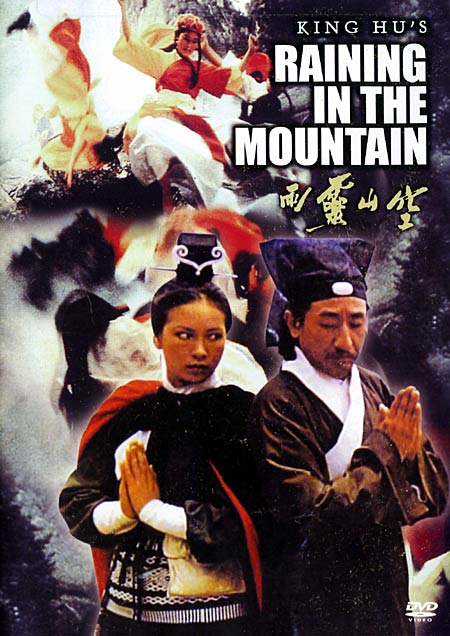
RAINING IN THE MOUNTAIN
Hong Kong, 1979, 120 minutes, Colour.
Hsu Feng, Tung Lam, Paul Chiang.
Directed by King Hu.
Raining in the Mountains was directed by one of Hong Kong’s leading directors, King Hu. Born in Beijing, he migrated to Hong Kong and contributed to the Hong Kong film industry for thirty years from the mid-60s to the mid-90s. He made the celebrated A Touch of Zen in the late 1960s as well as The Swordsman in 1990.
While the film does feature swordplay and action, it is different from the popular Hong Kong films of this period. King Hu went to remote areas, filmed beautiful mountain scenery and gave an atmosphere of the beauty of China. He also shows a monastery – and the role of contemplation in Chinese Buddhist traditions. The film has a subplot about robberies and there is action as well. However, this is a more contemplative approach to action film-making than the martial arts popular films of that time.
1. An entertaining film from Hong Kong? The martial arts? The martial arts in a more serious context of Chinese history? Religious themes?
2. The colour photography, the use of wide screen? The Korean locations and their beauty? The monastery and life within it? The exteriors? The martial arts sequences and special effects? The assemblies. the decorum of the monastery in contrast with the action sequences? The musical score and its rousing style?
3. The structure of the film - their pilgrimage, the situation at the monastery and the new abbot and his election, the visitors and their greed, the former convict and his place in the monastery and his emergence as the new abbot, the devices to steal the scroll, intrigue within the monastery, the final confrontations, the new abbot and his taking control, the role of the old abbot as the boat man, the final action sequences and the destruction of the scroll? An entertaining and interesting thriller screenplay? The parallels with western thrillers? The Hong Kong variations in terms of Buddhism, religious tradition, the politics and intrigue, the violence and greed? The final action?
4. The plausibility of the plot - contrived for this kind of martial arts epic? The characterisation, their behaviour - especially the highlights of the martial arts and their powers?
5. The situation of the monastery - the Buddhist religious traditions and the way these were presented? A true spirit of religion and worship in the monastery? The number of the monks, their style of life, community living, poverty, resources? The officials in the monastery and their advice to the abbot, greed, alliances with the merchant and the Governor? The prevailing of right order? The tradition of the old abbot? The importance of the scroll? Traditions, prayer, legends?
6. The old abbot and his decorum, his advice, the choice of the new abbot? The ex-convict and his role in the monastery, his being frames, his emergence as abbot, his strong control? His rivals and their alliances with Governor and merchant? The old abbot's adviser and his role in the new regime?
7. The merchant and his journey to the mountains, his entourage and their mission? Their presence in the rituals, the manoeuvres and strategies to get the scroll? The confrontations? The contrast with the Governor and his henchmen? Their violence, intrigue? The final confrontations and fights even to death?
8. The significance of the scroll and its final destruction? The resolution of the film and the bringing together of all the strands?
9. Political themes and the nature of intrigue? This plot giving strength to the action drama?
10. A satisfying entertainment - the balance between the spiritual and the physical? Beauty, spectacle, human, suspense and violence? The impact of the Hong Kong film industry in the '70s?